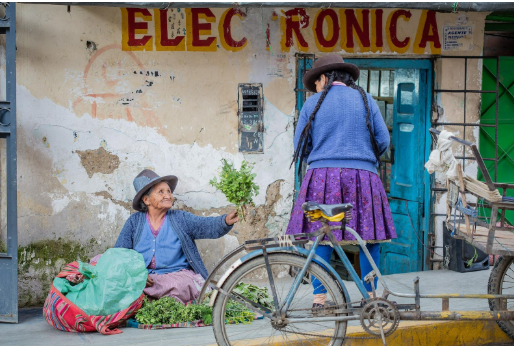Paola Lozada Lara*
The neoliberal economic system has demonstrated profound contradictions that emphasize inequality and poverty, leaving profits to the richest and excluding the rest of social actors. The response in Ecuador is civil society that, within the framework of the solidarity economy, seeks to represent a countermovement based on alternative economic practices.
These practices are outside formal economic indicators because their resistance lies in non-cooperation with neoliberal economics. This implies that the excluded population refuses to participate in the prevailing model as it is against its logic and, on the contrary, seeks to transform the economic system or establish an alternative one. Hence, the discourse of the solidarity economy tends to build a more just society and vindicates the participation of the population excluded from the market and the state based on their own practices.
Although some of these alternative practices have been classified as survival strategies and were found from pre-Columbian societies (barter, minga, etc.) to more organized forms such as cooperatives, microcredit initiatives, savings banks, etc., the management of the countermovement by civil society and grassroots communities to reproduce sustainable practices. They seek to exclude asymmetric relationships and benefits for the majority; as well as generating advocacy proposals and generating awareness of the benefits derived from the solidarity economy.
In Ecuador, the social and solidarity system was incorporated in the 2008 constitution, a fundamental milestone in the struggle, granting recognition to this economic sector. Its origins date back to the 19th century with craft and mutual aid organizations promoted by the church, later cooperative movements appear. Since the 1950s, the influence of religion and international financial assistance promoted its development without sustainability and resulted in an approach to communism and socialism. Catholic progressivism was present in the 70s oriented towards credit, technical assistance and training for grassroots communities, but it turned into religious paternalism, especially from Spain and Italy. NGOs appeared in the 80s and 90s when the state’s capacity to fulfill its economic and social commitments was diminished. These actors raised awareness about the importance of the community, as well as strengthened solidarity, participatory capacity and introduced alternative marketing mechanisms. The church and NGOs are joined by other pillars of support: indigenous people and popular sectors with their practices of resistance, as well as movements, collectives of producers and individuals with solidarity practices. All of them united under the objective of counteracting the neoliberal model with an alternative economy.
It is particularly interesting that in the identification of forms of solidarity economy, the Popular Economic Units (UEP) are included, which include sole proprietorships, family businesses, artisan workshops, people responsible for the care economy, among others, which made visible realities and actors not considered in the neoliberal model.
This sustained struggle, which had political impact and included grassroots communities starting in the 1970s, has achieved important results: recognition, awareness, visibility, articulation, political action. More specifically, the following were achieved: the elevation of the Ecuadorian Fair Trade Strategy to public policy in March 2017, the declaration of two cities (Quito and Riobamba) for fair trade in October 2017; and, the continuous organization of academic events and popular and solidarity economy fairs throughout the country.
However, the fight is not without challenges. There are two structural challenges to influence collective action: identity and strategy. In the identity of the struggle, there are still problems of dispersion in the movement due to the great diversity of actors in the solidarity economy, which makes it difficult to reach consensus even on the basis of common interests, so work must be done on communication channels. more fluids to strengthen the unit. A greater scope of political advocacy is also required since the activities are carried out mostly in rural areas; Finally, there is the lack of connection with other social movements. Regarding the strategy, the context must be delved into; This implies reviewing the co-option of political discourse with market logic, the competition of traditional exporters with lower cost products and the adaptation of public policy to the reality of the sector. Therefore, the collective action or countermovement aimed at the solidarity economy must continue with a more structured struggle in order to motivate a sustainable transformation of the economic model.
This document is based on the article: THE SOLIDARITY ECONOMY: A UNAGLUTINATING DISCOURSE OR THE POSSIBLE EXPRESSION OF A “COUNTERMOVEMENT”, published in the Magazine of the Catholic University of Ecuador on April 20, 2020.
*Paola Lozada Lara is an associate professor at the Pontifical Catholic University of Ecuador. He has a Master’s degree in International Relations and is a doctoral student at FLACSO Ecuador. His main research focus lies in peace studies and conflict resolution.
Translated by Damian Vasquez Kuliunas



